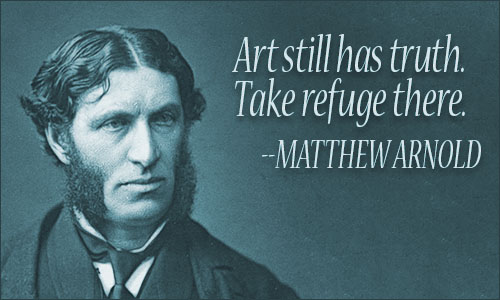MATTHEW ARNOLD QUOTES II
English poet & critic (1822-1888)

Notice: Undefined variable: id in /hermes/walnacweb03/walnacweb03ak/b2149/pow.notablequote/htdocs/a/includes/quoter.php on line 25
Time, so complain'd of,
Who to no one man
Shows partiality,
Brings round to all men
Some undimm'd hours.
MATTHEW ARNOLD
Notice: Undefined variable: id in /hermes/walnacweb03/walnacweb03ak/b2149/pow.notablequote/htdocs/a/includes/quoter.php on line 35
"Consolation"
Notice: Undefined variable: id in /hermes/walnacweb03/walnacweb03ak/b2149/pow.notablequote/htdocs/a/includes/quoter.php on line 61
Coleridge: poet and philosopher wrecked in a mist of opium.
MATTHEW ARNOLD
Essays in Criticism, Second Series
Sanity -- that is the great virtue of the ancient literature; the want of that is the great defect of the modern, in spite of its variety and power.
MATTHEW ARNOLD
preface, Poems
Resolve to be thyself: and know, that he
Who finds himself, loses his misery.
MATTHEW ARNOLD
"Self-Dependence"
For rigorous teachers seized my youth,
And purged its faith, and trimm'd its fire,
Show'd me the high white star of Truth,
There bade me gaze, and there aspire.
MATTHEW ARNOLD
"Stanzas from the Grande Chartreuse"
Physician of the Iron Age,
Goethe has done his pilgrimage.
He took the suffering human race,
He read each wound, each weakness clear --
And struck his finger on the place,
And said -- Thou ailest here, and here.
MATTHEW ARNOLD
Memorial Verses
Alas! is even love too weak
To unlock the heart, and let it speak?
MATTHEW ARNOLD
"The Buried Life"
The crown of literature is poetry.
MATTHEW ARNOLD
Essays in Criticism, Second Series
Wandering between two worlds, one dead,
The other powerless to be born,
With nowhere yet to rest my head,
Like these, on earth I wait forlorn.
MATTHEW ARNOLD
"Stanzas from the Grande Chartreuse"
The sea of faith
Was once, too, at the full, and round earth's shore
Lay like the folds of a bright girdle furled.
But now I only hear
Its melancholy, long, withdrawing roar,
Retreating, to the breath
Of the night-wind, down the vast edges drear
And naked shingles of the world.
MATTHEW ARNOLD
Dover Beach
We count the hours: these dreams of ours, false and hollow,
Shall we go hence and find they are not dead?
MATTHEW ARNOLD
A Question: To Fausta
The critical power is of lower rank than the creative. True; but in assenting to this proposition, one or two things are to be kept in mind. It is undeniable that the exercise of a creative power, that a free creative activity, is the true function of man; it is proved to be so by man's finding in it his true happiness. But it is undeniable, also, that men may have the sense of exercising this free creative activity in other ways than in producing great works of literature or art; if it were not so, all but a very few men would be shut out from the true happiness of all men; they may have it in well-doing, they may have it in learning, they may have it even in criticizing.
MATTHEW ARNOLD
"The Function of Criticism at the Present Time", Essays
Is it so small a thing
To have enjoy'd the sun,
To have lived light in the spring,
To have loved, to have thought, to have done.
MATTHEW ARNOLD
Empedocles on Etna
On the breast of that huge Mississippi of falsehood called History, a foam-bell more or less is no consequence.
MATTHEW ARNOLD
"Literary Influence of Academies", Essays in Criticism, First Series
That which in England we call the middle class is in America virtually the nation.
MATTHEW ARNOLD
"A Word More About America"
The kings of modern thought are dumb.
MATTHEW ARNOLD
Stanzas from the Grande Chartreuse
I keep saying, Shakespeare, Shakespeare, you are as obscure as life is.
MATTHEW ARNOLD
letter to Arthur Hugh Clough, Dec. 6, 1847
The same heart beats in every human breast.
MATTHEW ARNOLD
"The Buried Life"
I am past thirty, and three parts iced over.
MATTHEW ARNOLD
letter to Arthur Hugh Clough, Feb. 12, 1853
What actions are the most excellent? Those, certainly, which most powerfully appeal to the great primary human affections: to those elementary feelings which subsist permanently in the race, and which are independent of time. These feelings are permanent and the same; that which interests them is permanent and the same also.
MATTHEW ARNOLD
preface, Poems